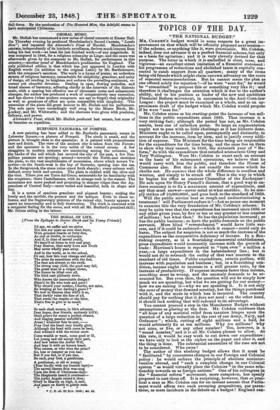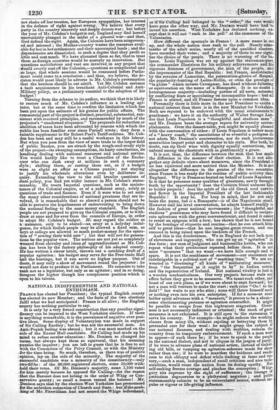TOPICS OF THE DAY.
"THE NATIONAL BUDGET."
Mn. COBDEN'S budget would in some respects be a great im- provement on that which will be officially proposed next session— if the scheme, or anything like it, were practicable. Mr. Cobden, indeed, does not advance it as a perfect financial scheme, but only as a basis for agitation ; and it is very cleverly devised for that purpose. The letter in which it is embodied is clear, terse, and vigorous—an excellent street imitation of a financial statement : his programme of reductions and abolished taxes is capitally con- cocted to catch support from all quarters; many of the items being old friends which might claim our own advocacy on the score of repeated recommendations. But he cannot mean the plan as one offered solely for rejection ?—if he were "sent for," he would be "committed" to propose this or something very like it ; and therefore it challenges the attention which is due to the author's ability, and to his position as leader of the new and ambitious Financial Reform movement, in succession to the Anti-Corn-law League : the project must be examined as a whole, and as an ap- proximate draft of the budget which Mr. Cobden would propose if he were "sent for."
Mr. Cobden states as his starting-point the increase of ten mil- lions in the public expenditure since 1835. That increase is a very striking fact ; although the period has not, as Mr. Cobden asserts, been one of unbroken peace. So large an augmentation ought not to pass with so little challenge as it has hitherto done. Ministers ought to be called upon, peremptorily and distinctly, to account for the increase, item by item, and to justify every addi- tion of expense. The Ministers for the time being are responsible for the expenditure for the time being, and the onus lies on them to show why they cannot, in 1849, the sixteenth year of " Re- form," do with the expenditure that satisfied aristocratic Grey and Tory Wellington. Were Mr. Cobden to exact such an account as the basis of his subsequent operations, we believe that he would carry with him the public, and therefore the House of Commons also. But that is not exactly the course which he chalks out. He assumes that the whole difference is needless and wanton, and simply to be struck off. That is the way in which he begins his office as amateur Chancellor of the Exchequer! He acts upon Sir Henry Parnell's dictum, that a good way to en- force economy is to fix a maximum amount of expenditure, and say that must answer—never mind at what sacrifice. So he sim- ply strikes off 10,000,0001., and goes back to the standard of 1835. Will the public service bear so rough and undiscriminating a treatment ? will Parliament endure it ?—Let us pause one moment to examine this the very foundation of Mr. Cobden's scheme. It may be quite true that the expenditure has increased since 1835 or any other given year, by five or ten or any greater or less number of millions : but what then ? So has the population increased ; so has the public business; so have the public demands on the public servants. Mere blind " retrenchment " would have little suc- cess, and if it could be enforced—which it cannot—could only do harm. The subject for suspicion is not so much the increase of the expenditure as the comparative deficiency of income. In a flou- rishing country, as in a flourishing commercial establishment, gross expenditure would necessarily increase with the growth of trade : Morrison's house is reported to "turn over" a million a year,—a large expenditure in the haberdashery line ; but it would not do to retrench the outlay of that vast concern to the standard of old times. Public expenditure, ceeteris paribus, will increase with population and business ; but, in a flourishing con- dition, income ought to increase in a still greater ratio, by the increase of productivity. If expense increases faster than income, something must be wrong, and the anomaly demands to be ac- counted for. But even then, the question will not be simply how much we are spending, but what we are getting for our money— how we are raising it—why we are spending it. It is not only the sums of money that demand scrutiny, but the things purchased with it, and the mode in which loss is incurred. The country should pay for nothing that it does not need : on the other hand, it should lack nothing that will redound to its advantage. You cannot proceed a step in the Manchester Budget without assumptions as glaring as the first. Mr. Cobden confesses that "all hope of any material relief from taxation hinges upon the question of a large reduction in the cost of our Army, Navy, and Ordnance"; which, cutting off eight millions and a half, he would arbitrarily fix at ten millions. Why ten millions? why not nine, or five, or any other number ? Ten, however, is a "round number," and it is all Mr. Cobden pleases to allow. At this rate, it would be easy work to cut down our expenditure: we have only to look at the cipher on the paper and alter it, and the thing is done. The substantial necessities of the case are not to be considered. Who cares ?
The author of this slashing budget allows that it must be " facilitated " by concurrent changes in our Foreign and Colonial policy : he would enforce the principle of absolute noninter- vention abroad, and " such a complete change in our Colonial system " as would virtually place the Colonies " in the same rela- tionship towards us as foreign nations." One of his colleagues in the " financial reform" movement, more outspoken, has openly proposed to cast them off. It is surprising, however, that so prac- tical a man as Mr. Cobden can for an instant assume that Parlia- ment would affirm two such sweeping propositions, par paren- these, as mere incidents in the debate on a budget ! England can-
not shake off her treaties, her European sympathies, her interest in the defence of right against wrong. We believe that every
party in the country sincerely and deeply detests war ; but before the year of Mr. Cobden's budget is out, England may find herself unavoidably plunged in the midst of a general war—and then, God defend the right. Again, the Colonies have been misgovern- ed and misused ; the Mother-country wastes the resources avail- able for her in her settlements and their unoccupied lands ; and the dependencies are dissatisfied, to such a degree that they profit us little and cost much. We have alienated them so far, that to treat them as foreign countries would be scarcely an innovation. But questions multifarious and vast are involved, in any project that would overtly cast off the Colonies,—questions so complicated and so large, that whole sessions would be consumed before Parlia- ment could come to a conclusion ; and then, we believe, the de- cision would most likely be adverse to Mr. Cobden's presumption that the burdens should be cut adrift. Yet Mr. Cobden assumes a tacit acquiescence in his trenchant Anti-Colonial and Anti- Military policy, as a preliminary essential to the adoption of his budget Turning from the scheme to its author, we think that it is likely to restore much of Mr. Cobden's influence as a leading agi- tator, but at the same time to confirm the limitation which has been put upon the estimate of his genius for public affairs. The commercial part of the project is distinct, practical, substantial, con- sistent with received principles, and recommended by much of the projector's "unadorned eloquence." The proposals for reduction or abolition of taxes have been advocated by reasons with which the public has been familiar ever since Parnell wrote; they form a suitable supplement to Sir Robert Peel's Tariff-reforms. Mr. Cob- den has been and may still be a useful workman in this labour. But when you pass from the view of mere trade to the larger field of public finance, you are struck by the rough-and-ready style of the project—its sweeping assumptions, its hasty conclusions, its headlong dealing with national resources and national service. You would hardly like to trust a Chancellor of the Exche- quer who can dash away at millions in such a summary style ; shifting them, or casting them out, as if a budget were as slight an affair as a Chinese puzzle; not staying to justify his wholesale alterations even by deliberate in- quiry. Extending the view to the still broader questions of state policy, you find yet wider lacunae in Mr. Cobden's states- manship. He treats Imperial questions, such as the mainte- nance 9f the Colonial empire, or of a sufficient army, solely as questions of trade and finance. Even if it were wise to set aside the many other considerations of national greatness that are in- volved, it is remarkable that so shrewd a person should not be able to perceive the hopelessness of endeavouring to bring down the national feeling to the same money standard. The English people are not prepared to give up the Colonial empire, or to with- draw at once and for ever from the councils of Europe, in order to adopt Mr. Cobden's budget. He may regard the soldier as a nuisance, only to be abated—an army as a holyday indul- gence, for which foolish people may be allowed a fixed sum, as boys at college are allowed so much pocket-money for the opera- tion of " sowing their wild oats " ; but that will not for genera- tions be the popular view. The nations are not yet so completely weaned from chivalry and ideas of aggrandizement as Mr. Cob- den has been by the factory philosophy of his adopted county. He has written a clever letter, thrown out a catching draft of a popular agitation : his budget may serve for the Free-trade Hall and the hustings, but it can serve no higher purpose. Out of doors, it may rally a show of movement round the projector : he would not dare to produce it in Parliament. He consents to take tank not as a legislator, but only as an agitator ; and in so doing, foregoes the higher though less conspicuous position which is open to his talents.



























 Previous page
Previous page